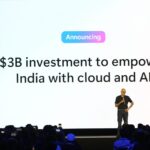Twenty-four-year-old, Anmol Goel is poised to become the youngest venture capital fund manager to independently raise and run an eight-figure fund. His firm, Aryan Ventures, is more than a typical VC fund – it’s a bold mission to identify, back, and build the next generation of Indian diaspora-led startups across the United Kingdom and United States.
From the narrow lanes of Janakpuri in West Delhi to the sleek boardrooms of Aryan Ventures, Goel’s journey is a powerful narrative of grit, ambition, and identity – proving that where you come from can fuel where you’re headed. In February 2025, he was invited to the Indiaspora Forum for Good in Abu Dhabi and Dubai – an exclusive gathering of influential global leaders of Indian origin.
But before he was making waves on global stages or investing in startups across London, New York, and San Francisco, Goel was just a boy growing up in a one-bedroom apartment near Janakpuri — a space he shared with four others.

Long before he was investing in startups from London to New York to San Francisco, Goel was just a kid growing up in a cramped one-bedroom apartment near Janakpuri — a space he shared with four others. Today, he’s building a future where stories like his aren’t outliers, but blueprints.
“Our whole world fit in that one room, Goel told South Asian Herald. “The neighborhood hasn’t changed much. Even today, most people there earn around $300–$400 a month. But my parents — they moved heaven and earth to get me to the UK.”
Chapter One: From West Delhi to Wall Street
After arriving in the UK, life didn’t suddenly get easier for him. Like many first-generation immigrants, he started working early at 15, mowing lawns, folding clothes at Primark, and tutoring after school. “I didn’t want to take anything for granted. Every job, every hustle, was a step toward repaying the sacrifices my parents made,” he added.
Soon, Anmol earned a spot at the University of Liverpool, where he studied Mathematics and Economics. At 19, he went on to launch his first startup: a quantitative trading algorithm intended for hedge funds.
It was “smart and ambitious,” and way ahead of its time, but it didn’t take off, he said adding his second venture – a real estate scraping bot that identified below-market-value properties – was more promising.
“It made sales. But a lack of legal protection allowed an opportunistic investor to appropriate the IP,” he added. “That was my first heartbreak in business. I learned the hard way about contracts, governance, and protecting what you create.”
Several more ventures followed where he had small wins and sharper lessons. He graduated top of his class and landed at J.P. Morgan, first in investment banking and later in wealth management. From there, he transitioned to Marsh McLennan, where he advised pension funds and large-scale insurance clients on risk. But even amid the prestigious logos and plush office spaces, something didn’t sit right.
“I was doing well on paper. But I wasn’t fulfilled. What excited me wasn’t Excel sheets or boardrooms. It was people. Builders. Founders,” he noted.
Chapter Two: The Startup Whisperer
He mentioned that while working in finance, he started mentoring early-stage founders on the side. It began informally — helping friends of friends refine pitch decks or build go-to-market strategies. Then it scaled. One founder turned into two. Then ten. Then dozens.
Anmol’s knack for strategy, coupled with lived entrepreneurial experience, made him a rare operator-turned-advisor who actually understood the trenches. As his startup advisory work expanded, so did his ambitions. He began syndicating deals and eventually writing his own angel checks. But as his exposure deepened, he noticed a recurring pattern.
“Startups weren’t failing because of bad ideas. They were failing because they lacked access — to tech talent, to sales infrastructure, to execution support. They were constrained by capital and capacity,” he explained.

To fill that gap, he made a bold move: acquiring a development agency and a sales company, which he merged into a venture studio. The model was simple but effective — provide tech and sales execution for equity. Rather than writing large cash checks, he injected operational firepower.
In 2024 alone, he facilitated over $55 million across 3 angel checks, 7 venture studio investments, and 12 syndicated deals.
But it wasn’t until a pivotal moment in August 2024 that the vision truly crystallized.
Chapter Three: “It’s Good to See Someone Like You”
It was during a keynote panel in Spain. The audience — over 1,200 strong — was packed with VCs, founders, and ecosystem leaders. But as he scanned the room, a sobering realization hit him. “I was the only brown person on stage. The only Indian,” he added.
After the panel, a young man approached him. Indian, like him. “It’s good to see someone like you up there,” the man said quietly. It wasn’t flattery — it was recognition. Representation.
“That one sentence stayed with me,” he said. “Because when I looked at the statistics, it didn’t make sense. Why were there so few of us in the room, when we’re statistically outperforming almost every other group?”
He dove into the data. What he found was staggering.
Chapter Four: The Diaspora Edge
According to him, in the UK, British Indians make up just 3 per cent of the population. But they account for nearly 12 per cent of all unicorns created over the past decade. That includes standout startups like OakNorth, Wayve, Shazam, Zopa, Blippar, and Founding Circle. And it’s not just tech — Indians are the highest-earning ethnic group in the UK, with an average salary of nearly £50,000 compared to the national average of £28,000.
In the US, the disparity is even more dramatic. Indian-origin individuals represent only 1.6 per cent of the American population. Yet they’ve co-founded 165 of the country’s 1,028 unicorns — over 16 per cent of the total. That’s a 9x overrepresentation, he added.
He emphasized that the outperformance can be attributed to four key areas including Education, Community-Oriented Culture, Cost Consciousness & Grit, and Generational Business Wisdom.
Chapter Five: The Birth of Aryan Ventures
With those insights — and momentum on his side — he launched Aryan Ventures in late 2024 with a clear thesis: to back startups in the UK and US with at least one Indian-origin co-founder.
“We’re not trying to box people in,” he clarified. “This isn’t exclusionary. It’s about inclusion. About supporting founders who statistically outperform but are still underrepresented in key decision-making circles.”
Aryan Ventures operates with a multi-tier approach including Internal Network acceleration, Direct Fund Investments, and Syndicated Rounds. More than capital, Aryan Ventures offers access: to a community of diaspora leaders, a technical back office, distribution support, and a founder-first ethos.
“We’re betting on people who’ve already shown they know how to beat the odds,” Goel mentioned.






